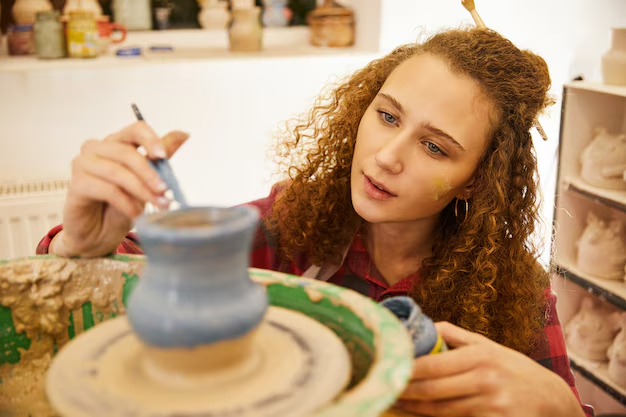Starting a paint-your-own pottery business can be a rewarding and creative venture. This business combines artistry, community, and a touch of fun, making it appealing for both business owners and customers alike. If you’ve got a love for pottery and want to share that passion, creating a paint-your-own pottery business could be your perfect path.
In this guide, we’ll cover everything you need to know about starting a paint-your-own pottery business, from initial planning and setup to marketing and maintaining customer satisfaction. Let’s get you on your way to crafting not only beautiful pottery but also a thriving business!
What is a Paint Your Own Pottery Business?
A paint-your-own pottery business is a space where people can come in, choose a piece of pottery, paint it to their liking, and take it home as a personal keepsake. Think of it as a creative workshop combined with a storefront – customers can express themselves through art while enjoying a relaxed, welcoming environment.
Why Start a Paint Your Own Pottery Business?
Starting a paint-your-own pottery business has unique benefits:
- Creative freedom: You get to work in an artistic field where you can let your creativity shine.
- Community engagement: This business often attracts people looking to relax, bond, and create memories with friends or family.
- Low entry barriers: Compared to other businesses, a paint-your-own pottery studio requires relatively low startup costs.
- Consistent demand: People love experiences, and pottery painting is a fun and lasting one. From birthday parties to team-building events, there’s always an audience.
Steps to Starting a Paint Your Own Pottery Business
1. Research and Plan Your Business
Starting with a strong plan is key. Here’s what to consider:
- Market research: Look at the local competition, customer demographics, and market trends. Understand your potential customer base and their preferences.
- Choose a business model: Decide whether you want a mobile setup, a dedicated studio, or an online option where people can order pottery kits to paint at home.
- Identify your services: Aside from pottery painting, consider offering workshops, events, or private parties to diversify your revenue.
2. Secure Your Startup Costs
You’ll need some initial funds to get things rolling. Here are common expenses:
- Studio space rental: Find a location that’s easily accessible with good foot traffic. If you’re starting small, you can even consider a pop-up or shared space.
- Equipment and materials: Stock up on pottery pieces, paint supplies, brushes, and a kiln if you plan on doing the firing yourself.
- Business essentials: Furniture, shelving, decor, and lighting to make the studio feel inviting and functional.
Tip: Consider looking for small business grants, or approach family and friends for initial investments to reduce debt.
3. Choose Your Pottery and Supplies
The quality and variety of your pottery items play a huge role in attracting customers. Opt for beginner-friendly pieces like mugs, bowls, and plates, and add seasonal or holiday-themed items throughout the year.
- Paints and glazes: Use non-toxic, washable paints suitable for all ages. Having a variety of colors and textures will give customers more freedom in their designs.
- Tools and supplies: Provide different brushes, sponges, stencils, and stamps. The more options you offer, the more creative your customers can get!
4. Set Up Your Studio
Creating a comfortable and inviting space will encourage repeat visits. Design your studio to be clean, organized, and welcoming. A few key areas to consider:
- Seating: Ensure you have enough seating for individuals, small groups, and larger parties.
- Workstations: Set up well-organized stations where people can easily access brushes, paints, and water containers.
- Display area: Show off finished pieces to inspire customers and showcase the possibilities.
5. Build an Online Presence
Marketing is key to any new business, especially one that relies on community engagement. Here’s how to attract and keep customers:
- Create a website: List your services, prices, and location, and add a booking option if possible.
- Social media: Post regularly on Instagram and Facebook. Share customer creations, announce events, and offer special promotions.
- Email marketing: Build an email list for updates on special events, discounts, and new pottery pieces available to paint.
6. Offer Events and Classes
People love an opportunity to learn and socialize. Hosting events can increase visibility and build community loyalty:
- Pottery classes: Teach customers how to paint specific designs or use special techniques.
- Private events: Cater to birthday parties, corporate events, and family gatherings.
- Seasonal events: Plan themed events around holidays to draw in crowds looking for unique gift ideas.
Tips for Running a Successful Paint Your Own Pottery Business
- Keep an eye on trends: Stay updated on pottery painting styles, popular color schemes, and techniques. Offering these can keep your studio relevant and appealing.
- Customer service is king: Engage with customers, offer guidance if they need it, and make the experience enjoyable.
- Offer memberships: Reward loyal customers with discounts or exclusive events through a membership program.
- Have fun with it: Your enthusiasm can set the tone. If you’re excited about your business, customers will be too!
Conclusion
Starting a paint-your-own pottery business is more than just setting up a studio; it’s about creating an inviting environment where people can let their creativity flow. With the right planning, a passion for art, and a solid community-building approach, you can build a thriving business that makes a lasting impact on everyone who walks through your door.
FAQs
Q: Do I need experience in pottery to start this business?
A: While experience helps, it’s not necessary. Many business owners learn as they go or hire a skilled team. What matters most is your ability to provide a fun, supportive environment.
Q: How much does it cost to start a paint-your-own pottery business?
A: Startup costs can vary depending on location and studio size, but most can get started with around $10,000 to $30,000.
Q: Can I operate this business from home?
A: Yes, some people start with a home studio, especially if they’re doing mobile events or offering kits for customers to paint at home.
Q: What permits or licenses do I need?
A: Licensing requirements vary by location, but generally, you’ll need a business license, zoning permit, and possibly health and safety clearances if you serve food or beverages.Q: How can I make my studio stand out?
A: Focus on creating a unique experience with engaging themes, high-quality materials, and excellent customer service.











